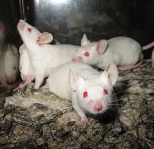 Statistics on the use of animals in scientific research in Great Britain have been published by the Home Office. The document, Statistics of scientific procedures on living animals 2011, was compiled from returns provided by 100% of project licence holders and published on 10 July. The figures show that just over 3.79 million scientific procedures were started in Great Britain in 2011, an increase of 2% on 2010. The breeding of genetically modified animals and harmful mutants – mainly mice – remained stable, accounting for 1.62 million procedures.
Statistics on the use of animals in scientific research in Great Britain have been published by the Home Office. The document, Statistics of scientific procedures on living animals 2011, was compiled from returns provided by 100% of project licence holders and published on 10 July. The figures show that just over 3.79 million scientific procedures were started in Great Britain in 2011, an increase of 2% on 2010. The breeding of genetically modified animals and harmful mutants – mainly mice – remained stable, accounting for 1.62 million procedures.
The Animals in Science Regulation Unit (ASRU) has also published its annual report for 2011. The report provides a collective account of the activities of the home office regulation of animal testing.
Home office minister Lynne Featherstone commented: "The report shows the important work being done in this country to regulate animal procedures and to ensure the UK's high standards of animal protection are upheld.
"While we recognise the need to use animals in order to help develop potentially life-saving drugs and treatments, we are also working to reduce the use of animals in research. As part of this on-going work, we will continue to promote measures that will 'replace, reduce and refine' the use of animals in scientific testing."
The comment refers to a requirement that all scientists and researchers undertaking animal research in the UK take into account the '3Rs' (measures to replace, reduce, and refine animal use) when devising their programmes of research proposals. When work is licensed, all reasonable steps must be taken to minimise the numbers of animals used and any suffering likely to be caused.
The Animals Scientific Procedures Act 1986 regulates the use of animals in scientific experiments and ensures their use is limited to where there is a clear potential benefit to people, animals or the environment, and when there is no means of obtaining these benefits without animal use, or at a lesser animal welfare cost.
• Picture by Aaron Logan